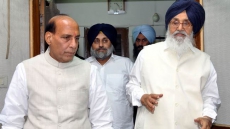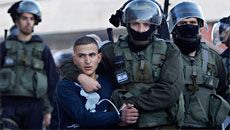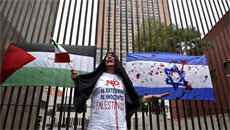KABUL - Afghanistan's feuding presidential candidates agreed Friday to resolve their election dispute and said they would set an inauguration date before the end of August.
The breakthrough came as U.S. Secretary of State John Kerry opened a second day of talks in Afghanistan aimed at preventing the fragile country from collapsing into political chaos after disputed elections. It was a diplomatic victory for Kerry, who has struggled for similar breakthroughs between the Israelis and Palestinians.
"This is really an Afghan solution to an Afghan problem," Kerry said at a news conference. "Both parties have agreed to stay at it, and both parties have agreed to live by the outcome."
Kerry paid a courtesy call on Afghan President Hamid Karzai and met later with the two men, former Foreign Minister Abdullah Abdullah and former Finance Minister Ashraf Ghani Ahmadzai. They've been locked in a bitter dispute over who will succeed Karzai.
Kerry's visit comes as the election results are being audited in a process that he brokered last month but that had halted to mark the end the of the Muslim holy month of Ramadan in late July. The audit resumed earlier this week with representatives of both candidates participating but still at odds over charges of widespread election fraud in the June 14 runoff. Preliminary results of the poll showed Ghani Ahmadzai well ahead of Abdullah, but both sides alleged fraud.
Abdullah called the agreement "another step forward in the interests of strengthening national unity in the country, strengthening rule of law in the country and bringing hope to the people for the future of Afghanistan."
Ghani Ahmadzai said he and Abdullah, whom he called a "brother and colleague," were determined to turn what he termed a "vicious circle" of turmoil in many parts of the Muslim world into a "virtuous circle" for the people of Afghanistan. He also said that "solving the problems of the country cannot happen on the basis of a winner-take-all approach."

Ghani Ahmadzai said he hoped that an exact date for the inauguration would be "very firm" in the next week to 10 days.
The three men shared a moment of levity when Kerry directed a reporter's question to "the next president of Afghanistan." Both men moved toward the single microphone, as Kerry jokingly said he hadn't intended to create a stir. Ghani Ahmadzai took the mic but acknowledged politely he was speaking "with presumption." Abdullah followed.
Kerry is on a previously unannounced visit to Kabul to urge the candidates to accept the results of an ongoing audit of all ballots from the June election and form a national unity government by early September when NATO leaders will meet in Wales to consider their options in Afghanistan.
Kerry called Friday's agreement a "pivotal time" in Afghanistan's future.
The U.S. believes the Sept. 4 NATO summit would be an opportunity for the eventual election winner to present himself to the alliance and introduce his new Cabinet, which, under a formula brokered by Kerry on his last visit to Kabul in June, would include the election loser appointing a new "chief executive officer," who would serve under the president. Once created, the Afghan government would convene a "loya jirga," or nationwide assembly, to formalize the chief executive post as a prime minister, the plan envisions.
With the clock ticking until the NATO summit, U.S. officials travelling with Kerry said he would stress the importance of the candidates looking at the "big picture" as the audit continues and not getting bogged down in endless debates over minor discrepancies that are unlikely to affect the final results.

Kerry arrived in Kabul just two days after U.S. Maj. Gen. Harold Greene was killed by an Afghan soldier at the national defence university. Greene is the most senior American soldier to be killed in the Afghan conflict and his slaying underscored the tensions that persist as the U.S. combat role winds down. The political uncertainty that Kerry is trying to address is another complicating factor in the transition.




